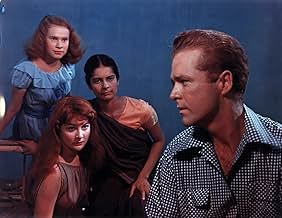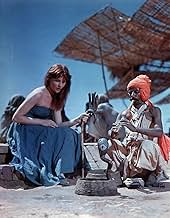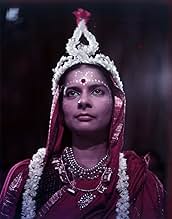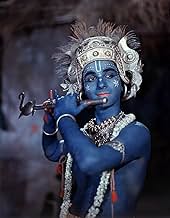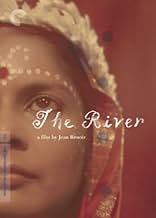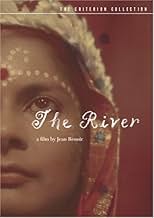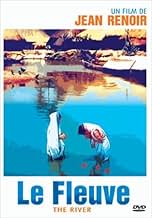AVALIAÇÃO DA IMDb
7,4/10
7,2 mil
SUA AVALIAÇÃO
Adicionar um enredo no seu idiomaThe growing pains of three young women contrast with the immutability of the holy Bengal River, around which their daily lives unfold.The growing pains of three young women contrast with the immutability of the holy Bengal River, around which their daily lives unfold.The growing pains of three young women contrast with the immutability of the holy Bengal River, around which their daily lives unfold.
- Direção
- Roteiristas
- Artistas
- Indicado para 2 prêmios BAFTA
- 3 vitórias e 4 indicações no total
June Tripp
- Narrator
- (narração)
- (as June Hillman)
Nimai Barik
- Kanu
- (não creditado)
Richard R. Foster
- Bogey
- (não creditado)
Jane Harris
- Muffie
- (não creditado)
Jennifer Harris
- Mouse
- (não creditado)
Trilak Jetley
- Anil
- (não creditado)
Sajjan Singh
- Ram Singh - The Gateman
- (não creditado)
Penelope Wilkinson
- Elizabeth
- (não creditado)
Cecilia Wood
- Victoria
- (não creditado)
Avaliações em destaque
10Fesch
This is one of those rare films which give you the impression after viewing it that you have truly lived and shared the lives of its characters (not just 'two people received that kiss', as they say in the film, but everyone who's watching the movie).
You became part of that river as the film progresses, it is perhaps the picture which has described the passage of time better than any other. It is life, running within its waters, that catches your soul, which melts with the river and the film and your memory...
I think it is the only movie that made me run to a bookstore to buy the book it was based on. Rumer Godden's work is beautiful indeed, but the film is far better for me.
Highly recommended!
You became part of that river as the film progresses, it is perhaps the picture which has described the passage of time better than any other. It is life, running within its waters, that catches your soul, which melts with the river and the film and your memory...
I think it is the only movie that made me run to a bookstore to buy the book it was based on. Rumer Godden's work is beautiful indeed, but the film is far better for me.
Highly recommended!
After a family tragedy, an adolescent girl blurts out angrily at the dinner table, "We just go on as if nothing has happened". "No", her mother responds, "we just go on". The River, Jean Renoir's first color film, is about going on -- the ebb and flow of life that mirrors the path of the sacred river Ganges that flows nearby. Filmed on location in India, The River is a sumptuously beautiful film that was called by Martin Scorsese ""one of the two most beautiful color films ever made" and one of his "most formative movie experiences." The film has been brought to life magnificently in a new Criterion DVD that contains an introduction by Jean Renoir, an interview with Scorsese, and a biography of author Rumer Godden, who grew up in India and whose work formed the basis for Powell and Pressburger's Black Narcissus (1947).
Set in India at the time of independence, its themes are universal: the feeling of being an outsider, of running away from unpleasant situations, and the hopelessly romantic stirring of adolescent love. While the film reflects the point of view of a British colonial family, it is respectful of the surrounding culture and pays homage to Hindu and Buddhist traditions through stories, documentary footage, and dance sequences. Harriet (Patricia Walters) is the adult narrator who looks back on her days as an adolescent. About thirteen in the film, she lives with her four sisters and brother Bogey in a colonial house in India that looks out upon the Ganges. Renoir's camera captures the energy and rhythm of life on the river: its peddlers, ships, markets, people coming and going, the crowds, everything in constant motion juxtaposed with the timeless tranquility of the river.
Harriet's father (Esmond Knight) who lost an eye during the war, runs a jute manufacturing plant while his pregnant wife (Nora Swinburne) takes care of the house, assisted by governess Nan (Suprova Mukerjee). When a young American named Captain John (Thomas E. Breen) comes to visit his cousin Mr. John (Arthur Shields) after losing his leg in the war, his dreams of being left alone are short lived. Harriet becomes infatuated with Captain John but has to contend with two other female admirers: her older friend Valerie (Adrienne Corri), a flaming redhead, and Mr. John's daughter Melanie (Radha Shri Ram), a young woman of mixed ethnicity who was born in India but reared in a British boarding school. The arrival of Captain John brings a clear signal that the girls must face the end of what has been an idyllic childhood.
All feel like outsiders: Melanie is caught between two cultures and questions whether she will ever fit into either, Harriet expresses her adolescent longings in idealistic poetry, Valerie is overwhelmed by her innocent desires, and Captain John is a deeply troubled man who only wants to live a normal life. Although the acting can be a bit wooden especially during peak dramatic moments, it does not detract from the film's authenticity. The River is definitely of its time and its attitudes towards women are dated, yet it is a work that transcends time and place to capture universal emotions. It is a great film that can be relished over and over again with increasing appreciation.
Set in India at the time of independence, its themes are universal: the feeling of being an outsider, of running away from unpleasant situations, and the hopelessly romantic stirring of adolescent love. While the film reflects the point of view of a British colonial family, it is respectful of the surrounding culture and pays homage to Hindu and Buddhist traditions through stories, documentary footage, and dance sequences. Harriet (Patricia Walters) is the adult narrator who looks back on her days as an adolescent. About thirteen in the film, she lives with her four sisters and brother Bogey in a colonial house in India that looks out upon the Ganges. Renoir's camera captures the energy and rhythm of life on the river: its peddlers, ships, markets, people coming and going, the crowds, everything in constant motion juxtaposed with the timeless tranquility of the river.
Harriet's father (Esmond Knight) who lost an eye during the war, runs a jute manufacturing plant while his pregnant wife (Nora Swinburne) takes care of the house, assisted by governess Nan (Suprova Mukerjee). When a young American named Captain John (Thomas E. Breen) comes to visit his cousin Mr. John (Arthur Shields) after losing his leg in the war, his dreams of being left alone are short lived. Harriet becomes infatuated with Captain John but has to contend with two other female admirers: her older friend Valerie (Adrienne Corri), a flaming redhead, and Mr. John's daughter Melanie (Radha Shri Ram), a young woman of mixed ethnicity who was born in India but reared in a British boarding school. The arrival of Captain John brings a clear signal that the girls must face the end of what has been an idyllic childhood.
All feel like outsiders: Melanie is caught between two cultures and questions whether she will ever fit into either, Harriet expresses her adolescent longings in idealistic poetry, Valerie is overwhelmed by her innocent desires, and Captain John is a deeply troubled man who only wants to live a normal life. Although the acting can be a bit wooden especially during peak dramatic moments, it does not detract from the film's authenticity. The River is definitely of its time and its attitudes towards women are dated, yet it is a work that transcends time and place to capture universal emotions. It is a great film that can be relished over and over again with increasing appreciation.
A really glorious, spellbinding movie. Filmed in Bengal, India, on the Ganges, it captures the essence of India, the timeless quality of life on the Ganges, without being patronizing.
This is a coming of age movie about three teenage girls, two British and one Anglo-Indian, and how their lives are affected by the arrival of a one-legged American war veteran. It's very easy to fall into sentimentality in a movie like this, but Renoir avoids this obvious pitfall. Though I have to say, I found this film very moving.
It helps that this movie is filmed in Technicolor, and is one of the best uses of Technicolor of that era.
Some of the performers were amateurs, including the actor who played the veteran and some of the children, but overall the performances are outstanding. A fine, low-key performance by Esmond Knight. This was the only film for Patricia Walters, who played Harriet, and Thomas Breen, the war veteran who played Captain Jack, never made any other movies. Watch for Arthur Shields, the brilliant Irish actor, as father of Nan.
This is a coming of age movie about three teenage girls, two British and one Anglo-Indian, and how their lives are affected by the arrival of a one-legged American war veteran. It's very easy to fall into sentimentality in a movie like this, but Renoir avoids this obvious pitfall. Though I have to say, I found this film very moving.
It helps that this movie is filmed in Technicolor, and is one of the best uses of Technicolor of that era.
Some of the performers were amateurs, including the actor who played the veteran and some of the children, but overall the performances are outstanding. A fine, low-key performance by Esmond Knight. This was the only film for Patricia Walters, who played Harriet, and Thomas Breen, the war veteran who played Captain Jack, never made any other movies. Watch for Arthur Shields, the brilliant Irish actor, as father of Nan.
Unlike many western movies i have seen that portrays Indians as if they were some nomadic people who are far from culture and sophistication, this film understands and illustrates the exact philosophy behind every deed that is performed by the Indians.
And also i wonder why can't so many great directors inspire from a film like this to understand that the true culture lies in philosophy and not in their race or color. I suppose it is easy to stick to stereotypes rather than educating through movies.
Therefore, it is not diversity for namesake that is important, but proper the depiction of one's understanding towards the diversity.
And also i wonder why can't so many great directors inspire from a film like this to understand that the true culture lies in philosophy and not in their race or color. I suppose it is easy to stick to stereotypes rather than educating through movies.
Therefore, it is not diversity for namesake that is important, but proper the depiction of one's understanding towards the diversity.
10dfmlsf
There is something special about this movie. In fact, to say there is something special does not tell much, and it could be equally applied to hundreds of films which are much less special than this. So let's start again. I had never seen a film like "The River" before. Thanks to the Spanish TV program "Qué grande es el cine" I discovered this piece of Art created by a major artist: Renoir. Some of my other favourite movies are similar in some aspects to others. And so, "North by Northwest" resembles other thrillers with Cary Grant; "A Touch of Evil" is a moral fable and also a nightmare which reminds a bit of "The Night of the Hunter", and so on. But "The River" reminds me of nothing I have seen on a screen. It has to do with ethics and with life. It has to do with balance, with understanding human nature. I think this film has everything which can be told in a film. Absolutely everything. I believe this film reflects an attitude towards life and towards art. So I got it finally! This film is if anything an attitude. Once you have seen, you feel better, you know more about life, your perspective has changed. It is a ray of light. I should be compulsory in High School and everywhere.
Você sabia?
- CuriosidadesThomas E. Breen, who plays Capt. John, was really missing one leg like his character.
- Erros de gravação(at around 36 mins) A cigarette appears from nowhere.
Principais escolhas
Faça login para avaliar e ver a lista de recomendações personalizadas
- How long is The River?Fornecido pela Alexa
Detalhes
- Data de lançamento
- Países de origem
- Central de atendimento oficial
- Idiomas
- Também conhecido como
- Río sagrado
- Locações de filme
- Empresa de produção
- Consulte mais créditos da empresa na IMDbPro
Bilheteria
- Faturamento bruto mundial
- US$ 53.357
- Tempo de duração
- 1 h 39 min(99 min)
- Proporção
- 1.37 : 1
Contribua para esta página
Sugerir uma alteração ou adicionar conteúdo ausente


